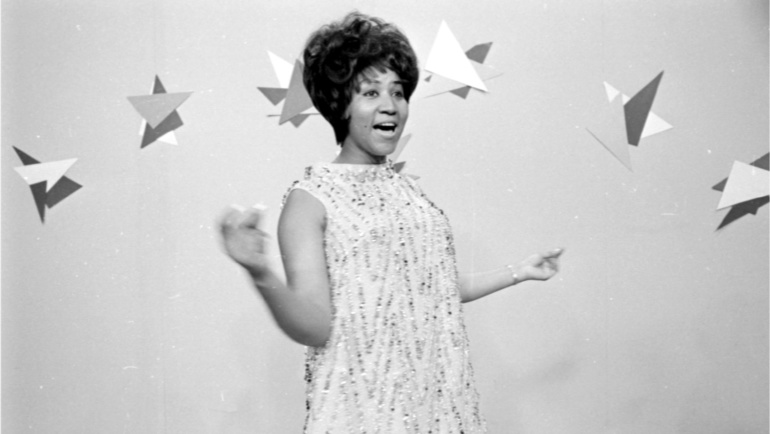
As media the world over sought reflections last year on the life and death of legendary singer Aretha Franklin, few probably realized how often it was archivists at Wayne State University who provided the looking glass.
Media requests from throughout the world are common, explained Alison Stankrauff, a university archivist who helps oversee and curate the massive, wide-ranging archives housed at the Walter P. Reuther Library. Further, added Stankrauff, those calls tend to pick up when there’s a notable anniversary or death.
When Franklin passed, however, the lines went haywire.
Countless phone calls and emails flooded in to every archivist in the department. Stankrauff said many people just reached out to any staff member listed on the library’s website, regardless of their area of expertise. Franklin’s death brought media requests from outlets ranging from the BBC to CNN to the Smithsonian.
“People were basically calling and just asking, ‘What all do you have on Aretha Franklin?’” said Stankrauff. “When someone passes away, you’re trying to capture the essence of who that person was. And, of course, we had that in our collection.”
Little wonder that Stankrauff and her colleagues were prepared to meet the demands. A repository of large swaths of Detroit collective memory, WSU’s collection acts as both pillar of community and point of reference, its files and shelves overflowing with audio and video files, paper and digital documents, photography collections and more. The university’s collection has three main areas of focus: Wayne State University, the Greater Detroit region and, of course, labor organizations and unions, including the social justice movements that labor organizations often support.
Phillip Mason, the library’s founding director, started the archival collection in the 1950s, first by collecting documents archiving the university’s history and later expanding to include information on the city of Detroit. While the collection didn’t begin with an organized effort to archive, it nonetheless went on to earn world-wide recognition. Mason himself has received numerous awards, including a lifetime achievement award from the Historical Society of Michigan.
Among the notable collections preserved at the library are a Detroit News photography collection – made up of about a million images total – that spans from 1904 into the mid-1980s; documents from the Detroit Branch of the National Association of the Advancement of Colored People (NAACP) dating back to the 1940s; a half-century of records from the AFL-CIO; hospital records that date back to the 1860s; the FBI files of Teamster leader Jimmy Hoffa; and papers from the likes of late Detroit mayor Coleman A. Young and slain civil-rights activist Viola Liuzzo.
Not unexpectedly, the Reuther Library archives, which employs 17 archivists total, also serves as the official repository for the historical record of eight of the largest international labor unions, including the United Automobile Workers and the United Farm Workers.
And, of course, there are the seemingly endless number of photos, images both iconic and obscure, takes on Detroit’s elite as well as its rank-and-file, each a small sliver of the ongoing narrative of a still-great American city. Between these pictures and its vast reservoir of information on Detroit and the men and women who’ve shaped its history and character, the library can sometimes seem like a one-stop shop for those looking to better understand Detroit and its diverse communities.
“We get contacted by all the major networks, and many other people as well,” said Louis Jones, field archivist. “People making documentaries, exhibits for museums, BBC, CNN, TIME and Newsweek. When people are doing stories on Detroit, or stories related to organized labor, we are a go-to place.”
And no instance illustrated that better than how the archivists responded to the demand for all things Aretha following the death of the Queen of Soul.
Stankrauff said she funneled most of the media requests to the three audiovisual archivists that work in the Reuther, ensuring that WSU was able to showcase before the world images that not only highlighted Franklin’s extraordinary musical moments but that also captured less-publicized aspects of her life, such as her commitment to political activism.
“The importance to the community is for people to know what happened, and what didn’t happen,” said Jones. “There’s a document that speaks to particular events.”
And Jones, Stankrauff and others at the library take great pains to ensure each document is carefully stored and secured. They also stress authenticity and originality, going to great lengths to ensure that there are no duplicates of any newly received documents.
Since each document in the collection is rare, the Reuther Library requires visitors to sign in. Access to the Reading Room, the room in which public archives can be accessed under supervision, is on the second floor. The elevator is locked and can only be accessed with a key. Archives tend to be old and need to be stored properly in order to slow decomposition. Some archives are stored in acid-free boxes and the storage areas have slightly cooler temperatures, all to lengthen the lifespan of these sensitive documents.
But the job doesn’t stop at preservation. Critically, WSU’s archivists are also responsible for cultivating close ties within the communities they serve – getting to know a variety of organizations, local leaders and everyday folks. In recent years, Wayne State archivists have been especially strengthening their relationship with the LGBTQ community, the Detroit dance community, and the community of Black lawyers and judges in Detroit.
“In each of these instances, we are the memory of these individual and collective communities,” said Jones. “Because the memories of people are inherently flawed, the records allow our researchers — whether they be the news media, documentary film makers, authors, doctoral students, professors writing books and journal articles or museum professionals curating exhibits, undergraduate students writing papers, among other researchers — to more accurately relate what happened. In one sense, we are the memory of communities.”
